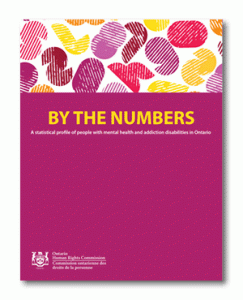 A new report by the Ontario Human Rights Commission (OHRC) reveals the challenging realities faced by people living with mental health or addictions disabilities in Ontario. By the Numbers, released October 5, 2015, uses Statistics Canada data from the 2012 Canadian Survey on Disability to get a better understanding of the population living with mental health and addictions in Ontario. The report reveals:
A new report by the Ontario Human Rights Commission (OHRC) reveals the challenging realities faced by people living with mental health or addictions disabilities in Ontario. By the Numbers, released October 5, 2015, uses Statistics Canada data from the 2012 Canadian Survey on Disability to get a better understanding of the population living with mental health and addictions in Ontario. The report reveals:
- Of the 15.5% of Ontarians who report having a disability, almost one third report a mental health or addiction-related disability
- Nine out of 10 Ontarians with a mental health or addictions disability report having another type of disability as well
- Almost 3 in 4 Ontarians with a mental health or addictions disability report having severe or very severe disabilities
- In contrast, a smaller proportion (39.5%) of people with other forms of disabilities report severe or very severe disabilities
- Ontarians with a mental health or addiction disability are more likely to live in poverty (19.6%) than those without a disability (10.4%) and those with other forms of disability (7.9%)
- People with a mental health or addictions disability face significant challenges with respect to employment. The numbers show that in 2011, their unemployment rate (22%) was more than twice the rate as for Ontarians with other disabilities and almost three times the rate for those without any disability. In addition, more than two thirds report facing disadvantage at work due to their mental health or addiction disability.
- More than twice the proportion of off-reserve Indigenous people report mental health or addiction disabilities than non-Indigenous people. Racialized people report a lower prevalence of mental health or addictions disabilities than non-racialized or Indigenous people .
By the Numbers: A statistical profile of people with mental health and addiction disabilities in Ontario (October 5, 2015) is available on the Ontario Human Rights Commission website.